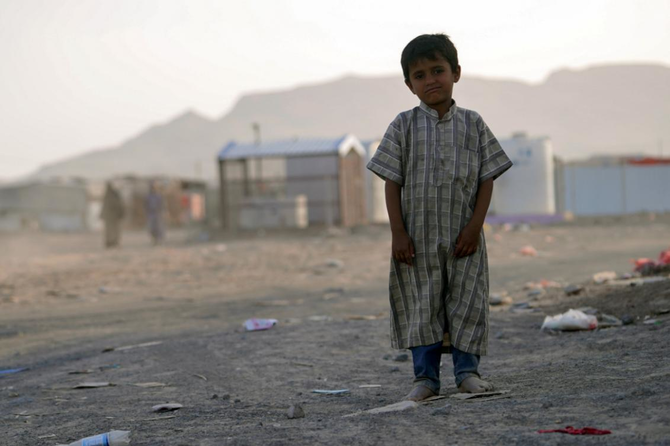UNITED NATIONS: The UN Security Council called for an immediate halt to fighting in Yemen on Wednesday, saying that only a lasting cease-fire and political settlement can end the six-year conflict in the Arab world’s poorest nation and the world’s worst humanitarian crisis.
In calling for a cessation of hostilities, the council singled out the military escalation by Iranian-backed Shiite Houthi rebels in the oil-rich central province of Marib, the internationally recognized government’s last stronghold in Yemen’s northern half. The offensive has put at risk an estimated 1 million civilians who have fled there since 2015 to escape fighting elsewhere.
The council’s press statement followed a briefing by UN special envoy Martin Griffiths, who said he couldn’t emphasize enough that the more than yearlong Houthi offensive “has caused an astonishing loss of life, including children who have been mercilessly thrown into the battle.”
Displaced people in Marib are living in fear for their lives, he said, “and the offensive has been until now constantly disrupting peace efforts.”
In 2014, the Houthis overran the capital, Sanaa, and much of Yemen’s north, driving the government of President Abed Rabbo Mansour Hadi into exile. A US-backed, Saudi-led coalition intervened the following year against the Houthis seeking to restore Hadi’s rule.
The intensified fighting in Marib has come amid an international and regional diplomatic push to end the conflict.
“The longer the Marib offensive goes on, the greater the risk to Yemen’s broader stability and social cohesion,” Griffiths warned. “It may lead to the transfer of conflict to other areas in Yemen, including those which have remained mercifully far from the main theaters of conflict. Yemen is an unstable country, easily destabilized.”
Griffiths expressed fear the Marib offensive may suggest to some that the war can be won militarily, but he said military conquest will only fuel further cycles of violence and unrest. He said Yemen can only be governed effectively by an “inclusive partnership” of “different political forces and components.”
UN humanitarian chief Mark Lowcock told the council that about 25,000 people have fled the fighting in Marib, many for the second or third time. If the fighting doesn’t stop, he said, “aid agencies fear up to 385,000 people could be displaced in the coming months.”
Lowcock warned that “famine is still stalking the country, with five million people just a step away from starving,” and COVID-19 cases are still surging, “pushing the health care system to collapse.” Famine, disease and other miseries are the result of the war and that is why “it is so important to stop the fighting,” he said.
Since March 2020, Griffiths has been trying to get the Houthis and the government to commit to a nationwide cease-fire, to reopen Sanaa airport to commercial traffic, ensure an uninterrupted flow of fuel and commodities through the main port of Hodeida, and to resume a political process aimed at reaching a political settlement.
“I am here to say that a deal is still very much possible,” Griffiths told the council.
“There is strong international backing and there is regional momentum for the UN’s efforts,” he said, expressing gratitude to Oman, Saudi Arabia, the United States and others. They are working closely and “without any differences between us,” he said.
Griffiths said the differences between the parties in Yemen “are not unbridgeable” and “a deal can be achieved easily, very quickly,” if both sides agree.
But he told the council that on several occasions during negotiations, the Houthis refused to meet with him, including recently. “To say this sends a wrong signal is an understatement,” he said.
Security Council members expressed support for Griffiths “and expressed their expectation that the Houthis meet him soon.”
Shortly after the council meeting ended, Secretary-General Antonio Gutteres announced the appointment of Griffiths as the UN’s next humanitarian chief, replacing Lowcock. But Guterres said Griffiths will continue to serve as the UN’s top envoy for Yemen “until a transition has been announced.”
In the coming weeks, Griffiths said, all countries should push the parties, in particular the Houthis, to conclude negotiations so the fighting stops.
“And I would like to be able to resolve that before we meet again,” he said.
UN Security Council urges immediate cease-fire in Yemen
https://arab.news/6pee8
UN Security Council urges immediate cease-fire in Yemen

- UN Security Council urges immediate cease-fire in Yemen
Jordanian forces destroy arms and drug trafficking workshops

- Criminal gangs used the sites along the northern border as bases for launching unlawful operations toward the heart of Jordanian territory
LONDON: The Jordanian military conducted a crackdown on several drug gangs involved in smuggling weapons and narcotics along the northern border with Syria.
The military announced on Wednesday that it targeted several factories and workshops used by gangs involved in arms and drug trafficking, which they used as bases for launching unlawful operations toward the heart of Jordanian territory.
Armed Forces personnel destroyed the sites after receiving intelligence in coordination with regional partners, according to the Petra news agency.
Syrian state media broadcaster Al-Ikhbariya reported on Telegram that the Jordanian army targeted “drug smuggling networks and storage farms in the southern and eastern countryside” of Sweida, in southern Syria.
The Jordanian Army is prepared to confront anyone threatening the security of the homeland and its citizens, addressing any threats with force as needed, The Petra added.












